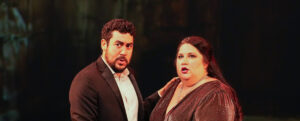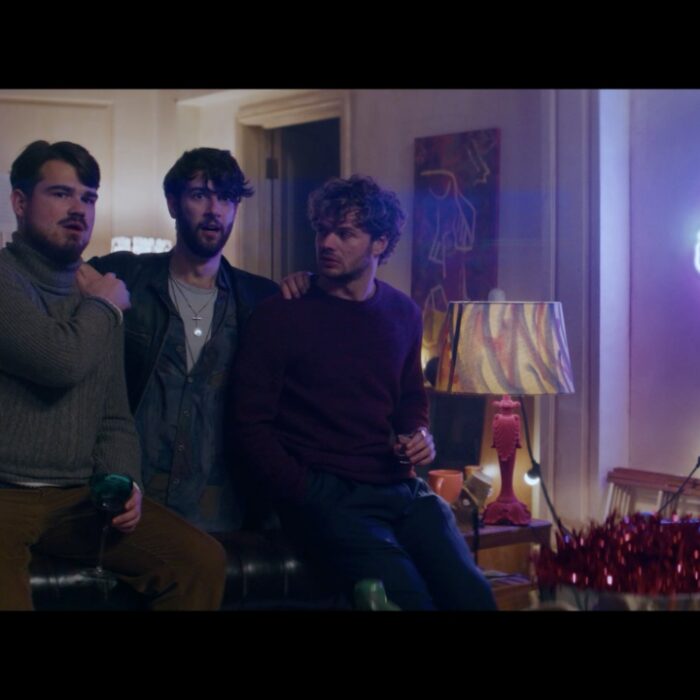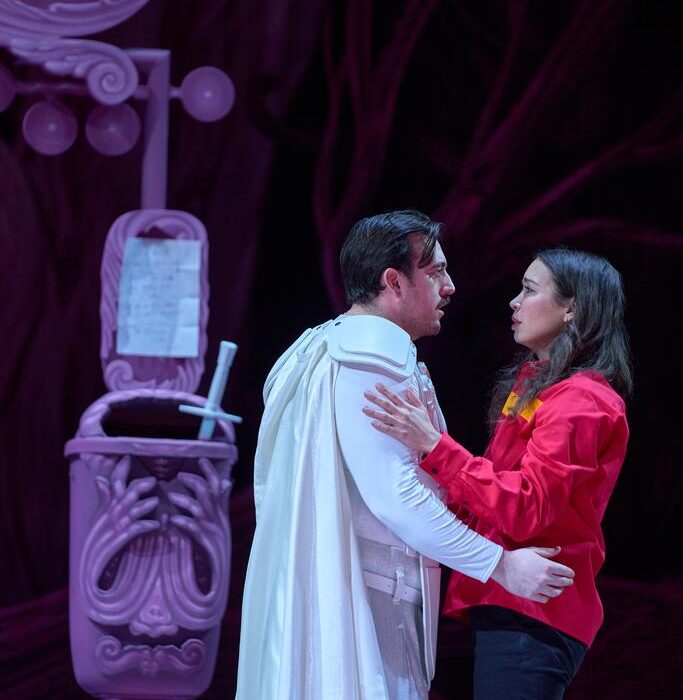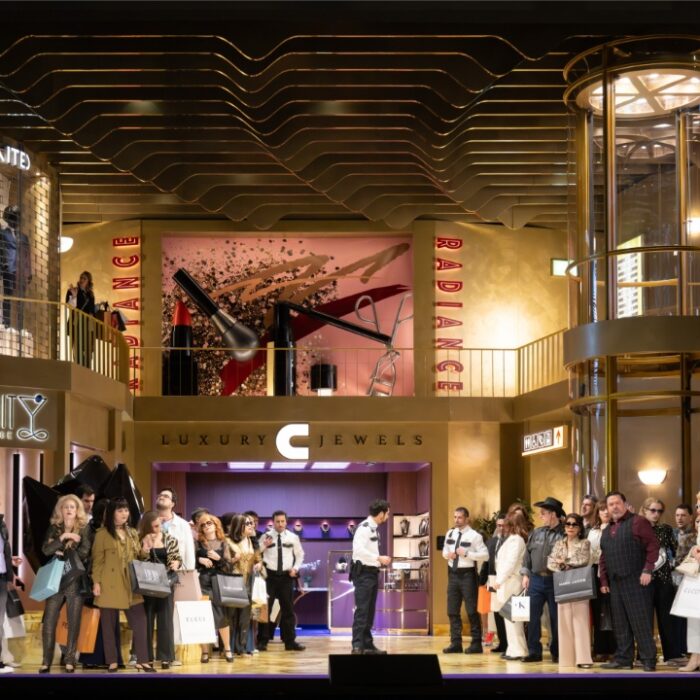
Teatro Nuovo 2025 Review: Macbeth
By David SalazarVerdi’s “Macbeth” is a pillar of the standard repertory, beloved for the composer’s ability to capture the spirit of one of the bard’s great plays. If “Macbeth” never captures the raw power of “Otello” or the immaculate precision and robustness of “Falstaff,” it is merely because of his three Shakespeare adaptations, this is the earliest in his oeuvre. And yet, some of the finest moments in “Macbeth” are right up there with those final masterpieces, including the famed “Patria oppressa” or “La luce langue.”
What’s fascinating about “Macbeth,” or at least the one that is a staple of the canon, is that that version of the opera belongs to 1865. At that point, Verdi was well into his “middle period” and had already composed such masterpieces as “Rigoletto,” “Il Trovatore,” “La Traviata,” “Un Ballo in Mascera,” and “La Forza del Destino.” The next opera he would write following the Paris “Macbeth” of 1865 would be “Don Carlo,” which many consider his finest and even most “Shakespearian” of operas.
Teatro Nuovo, with its mission to uncover the rare gems of the bel canto era, programmed “Macbeth” during its 2025 season in an attempt to shed light on the rarely heard and performed 1847 version, composed when Verdi was very much in his “galley” years with an astronomical output of often multiple operas per year. In 1847, “Macbeth” was one of three operas to get its premiere, alongside “I masnadieri” and “Jérusalem,” a remake of “I Lombardi alla prima crociata.”
The Original ‘Macbeth’
Listening to the original “Macbeth,” the gap between the two versions and the two Verdis that composed it couldn’t be more clear. While this isn’t a complete reimaging alla “Simon Boccanegra” where the original version is unrecognizable from the final one, but emotionally it resonates differently.
The first half of the opera, Acts one and two, feature several notable changes though no major structural overhaul. Macbeth’s pre-murder soliloquy has some notable changes, the Macbeth-Lady Macbeth duet has a “sunnier” tune, and Macbeth’s reactions to the ghost of Banco are also more in-line with bel canto traditions of the time. There are subtle shifts in the orchestration as well. But the biggest change is Lady Macbeth’s aria at the start of Act two. Originally, Verdi gave her “Trionfai!” a bravura piece full of exuberant coloratura. But in the context of an opera that already has the coloratura-happy “Or tutti, sorgete” and the similarly ornamented brindisi, it flattens the character a bit. “La Luce langue,” the piece that replaces it in 1865, adds darkness and in the context of the work at large, gives the opera greater texture and emotional contrast.
It’s in the second half of the show where the biggest structural changes occur. Act three feels like a different piece altogether and features an aria and cabaletta for the title character. In between, the Witches sing a choral passage that is often cut.
“Patria oppressa” is a completely different piece altogether. Where the 1865 version is a tone poem, this one is more in-line with Verdi’s famed choral passages from his early phase. It has drive and movement akin to something like “Va pensiero,” but wrapped up in a surprisingly anonymous melody from the composer who could spin a memorable tune out of recitative passages. In fact, I would argue that every piece Verdi did away with in this opera lacked that contagiousness so emblematic of his best work. Everything that he replaced those pieces with is memorable. The final scene is essentially a different piece altogether. The only thing that remains is “Pietà, rispetto, amore” but everything after is completely different from the second version. The battle music is different and Verdi’s fugue-like replacement is eons more immersive. Macbeth originally had an aria to end the opera, but bereft of any melodic momentum, the piece itself is an anti-climatic way to end such a potent piece of drama. The chorus that Verdi replaced at the ending is a perfect capstone to the piece and offers a book-end to Act four’s overall structure.
Rough Beginnings Before a Stable Middle and Excellent Ending
Leading the proceedings was conductor Jakob Lehmann, who presided over the Teatro Nuovo Chorus and Orchestra. Things did not get off to the most auspicious of starts. Tempi seemed to crash into one another and the brass textured overwhelmed the rest of the orchestra, creating a general hollowness. It was a wonky start and throughout the initial choruses, the orchestra continued to struggle. But before long, everyone found their bearings and for the remainder of the night, the ensemble was sharp as could be. The soloists were well-supported in each of their arias and were enabled the space to shift the colors and shape the lines with flexibility. There was no brute forcing here and it was clear throughout the rest of the evening that a great deal of emphasis and attention was placed on allowing the music to breathe. Balance was excellent and the pacing was exemplary.
Of course, the staging was minimal and hence unobtrusive. As with the orchestra’s rough beginning, the chorus looked rather static in its initial appearances, but soon thereafter, everyone started creating some semblance of a dramatic reality. That, combined with the sublime music-making created an experience that surpassed some stagings of the opera.
Powerhouses
Headlining the cast as Macbeth was Ricardo José Rivera, who gave a complex reading of the title role. In his initial scene with Banquo, he scaled back his voice, singing with a gentle and introspective timbre that allowed us to feel the self-doubt Macbeth feels upon hearing the prophecy. What was impressive immediately was the breath control and the fluidity of his legato line, prophesying the rest of his performance. The voice started to find some edge in the “Mi si affaccia un pugnal?” the baritone’s voice shifting from full-on forte outbursts to slender pianos, furthering the sense of doubt and insecurity. Rivera’s voice took on a more punctuated quality as he proclaimed his intent to murder Banquo, the voice finding a more stentorian bent. During the interjections that mark Macbeth’s fear of Banquo’s ghost, Rivera’s voice was more aggressive and pointed, the sound exploding into the space. Act three was truly special for the baritone as here he ratcheted up his potency, giving the sense of a battle of wills with the witches. During his aria in this act, the baritone sang softly and gently, the voice often a whisper. This was countered neatly by his more muscular vocal showcase during “Vada in fiamme,” where Verdi launches the forte orchestra on the baritone at the start of the recapitulation of the aria. The baritone managed every challenge, and his voice was at its most herculean during this scene. Then came “Pietà, rispetto, honore.” The baritone was far more intimate here, with the voice at its most tender. There was frailty in the interpretation, but also buoyed by a glorious, expansive legato line. Where most baritones would blast over the orchestra on “sol la bestemmia, ahi lasso,” Rivera managed the forte without having to shift the color of his voice to a more muscular or robust sound. Instead, he retained that darker hue that furthered the notion of his Macbeth at his most devastated. Once he calls his army arms, Rivera imposed a more robust quality and he retained, with added desperation throughout the final “Mal per me che m’affidai.” While the piece as the ending of the opera isn’t particularly satisfying, there was no doubt that Rivera’s pained utterance of “Vil coronna” was among the single-most electrifying moments of the entire evening.
Speaking of electrifying, Martin Luther Clark’s rendition of “O figli o figli miei” and the corresponding “Ah! la paterna mano” was show-stopping and garnered the greatest applause. While the tenor got to show off his booming voice as he called out to the entire castle following the discovery of Duncan’s assassination, the role of Macduff doesn’t get to distinguish itself outside of choral passages. The aria that Verdi gives him is a solid comfort for tenors who undergo the role, and while it is truly powerful in its dramatic context, it often gets overshadowed by the harrowing affect already caused by the 1865 “Patria oppressa.” But with the original version, the aria’s musical quality is far more resonant and Clark’s rendition of it was undeniably the best I’ve experienced live. The initial “O figli o figli” went from a gentle whimper to a more tortured cry. Aggression built throughout the recitative and you could feel Macduff channeling his anger toward Macbeth. But the “La madre sventurata” had a tenderness to it, and throughout the remainder of the recitative, you could feel the anger redirected inward. The aria was sung with tremendous passion and desperation, the honeyed voice emitting sublime, expansive legato that all built its way to a potent outpouring during “Trammi al tiranno in faccia,” the anger from the opening recitative redirected into determined resolve. The tenor’s high notes were pristine, but more eye-opening were the Corelli-like diminuendi that he managed during the final notes of the piece. He was solid the rest of the night, but this moment alone was star-making for Clark.
The role of Lady Macbeth is the definition of tour-de-force. She gets five solo numbers throughout the opera, with four of them positioned in that first half. Those first four require tremendous vocal flexibility and grit, and Alexandra Loutsion demonstrated them in spades. From her first appearance, reading the letter, she was the most committed to creating a character in the semi-staged space. Every single word came through cleanly throughout the night, and nowhere was this clearer than in that first scene. “Vieni t’affretta” was muscular and propulsive, the soprano sturdy throughout her range. The voice boomed into the space, immediately dominating the proceedings. While she didn’t have the same openness or even balance across the registers in the ensuing “Or tutte sorgete,” she dispatched the coloratura AND the ornaments in the repetition with gusto. Her duet with Rivera was remarkable in its ability to create contrast between the two. While he was softer in his vocalization, she maintained a thorny articulation in her singing, furthering the sense of divide between the two. More impressive was how present her voice was in the choral “Schiudi inferno inghiotti.” The aria “Tronfai! Securi alfine” is another coloratura showcase and Loutsion was at her most virtuosic here, the voice gleaming across her range. “Si colme un calice” was similarly well-articulated, the voice brilliant and the soprano imbuing great charm throughout. Lady Macbeth disappears for most of the second half of this version, but she gets her famous sleepwalking scene. Here, Loutsion showcased ample chest voice, imbuing her Lady Macbeth with an aggressive desperation. The voice grew throughout the passage. The passage sits low and the extreme highs, including a Db at the apex of the passage, give a lot of sopranos trouble. Loutsion’s voice hollowed a bit up top and that climactic high note was delivered as quickly as possible, but the soprano managed a haunting portrayal for the rest of the scene and an overall potent interpretation of the role at large.
As Banco, Cumhur Görgün displayed a luscious bass sound that feels so rare. In Verdi, you often get heavy-hitting basses with metallic sounds that, while shimmering and potent, often lack fluidity in the line. The result is choppiness in music that should rarely ever have that (Verdi himself is very specific about when he wants any of that kind of articulation in the music and writes it out himself). As such, Görgün’s legato lines, especially during the opening duet, were rich in their texture, matching up perfectly with Rivera’s timbre. His “Oh, qual orrenda notte!” was dark but honeyed, the lines free-flowing. And his famed aria, “Studia il passo, o mio figlio…” was similarly refreshing in its build of line and expansiveness. The orchestra was perhaps a bit overzealous here, but somehow, the bass, without having to push, managed to ride over the texture, delivering a knockout rendition.
The rest of the cast was solid, with soprano Jihye Seo a particular standout in several roles, most notably the lady-in-waiting. She displayed a sweet but fluid soprano that also managed to make its presence felt in the concertantos.
In all, this was a musically thrilling experience with top-tier singers.


